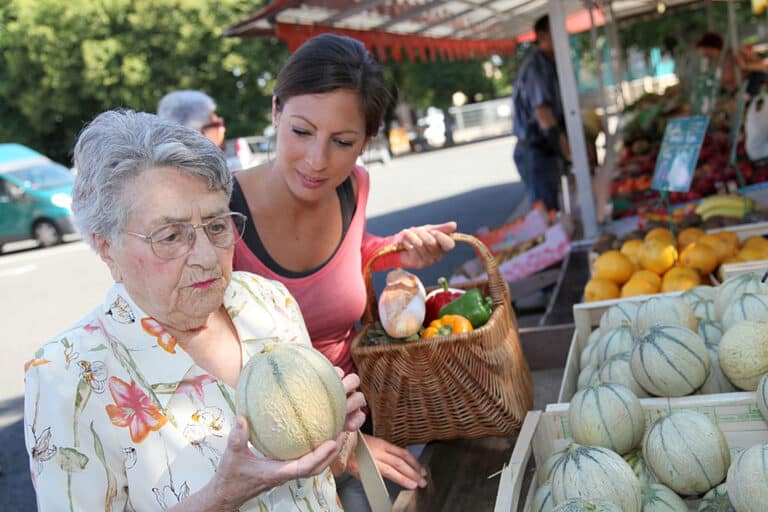There are two key components to reducing the risk of heart disease for your elderly loved one (and yourself): regular daily activity and eating well. While looking at that tiny list of two, it can seem like it should be fairly easy to incorporate those two healthy habits into a person’s life. However, they both can come with obstacles that may seem insurmountable to some. Additionally, for many, a budget can significantly affect healthy eating. In-home care providers can help.
Is Healthy Eating Really More Expensive?
The quick answer is yes. But the asterisk to that, yes, is that it may not be as expensive as your loved one thinks, and with some well-planned shopping and meals with the help of in-home care, that extra cost can be greatly reduced.
The main reason healthy foods cost more than “unhealthy” or prepacked foods is supply and demand. Fresh is always touted as best, but fresh doesn’t last as long as canned or frozen, so fresh costs more in many instances. It is easy to mass-produce packaged products, but many variables come into fresh products, such as the season, weather occurrences (like droughts or fires), and transportation costs.
How to Eat Healthier For Less
The good news is that some of those factors that cause fresh meat, produce, and grains to cost more can be reduced by shopping carefully and thoughtfully. This may be a new mindset for your elderly loved one, and having someone help her shop and prepare fresh products might be a good resource.
An in-home care provider is a great person to step in and support your loved one with shopping and meal preparation. From creating the shopping list to going to the store with your loved one and then helping her store and prepare the food so there is less waste, an in-home care provider will save your loved one money on her food expenses.
Five Ways to Save Money and Purchase Heart-Healthy Food
- Shop in Season: You might notice that oranges are more expensive at one time of year, or there are a plethora of tomato types at another time of year. The key is to know what’s in season in your area during each season and then make those items a big part of your loved one’s meal planning while they are the cheapest.
- Consider Where Your Loved One Shops: Some stores are known to be more expensive, and stores are not, but a fresh bag of apples tastes the same from both. Shopping wisely saves money.
- Frozen and Canned Are Okay: Both are usually less expensive than fresh and still provide many of the same great nutrients. The key is to read the ingredient label to make sure nothing else has been added to the product like salt, sugars, or food coloring.
- Purchase Value Packs: Many meats like chicken breasts come in value packs, which save money per pound but look overwhelming to a single senior. Your in-home care provider can help your senior repackage that large package of meat into smaller portions at home so she can use only what she needs when she wants it.
- Make Big Meals To Last The Week: A big pot of chili on Sunday that can be split into single servings for a week’s worth of lunches is a great way to save money.
With these tips and in-home care services, there’s less reason to choose unhealthy foods over heart-healthy foods.
If you or an aging loved one are considering In-Home Care in Riverview, FL, please contact the caring staff at Family First Healthcare Services today at (813) 461-8000.
Family First Healthcare Services is a top provider of in-home health services in Tampa, Bradenton, Brandon, Riverview, Lakeland, Winter Haven, Haines City, Lakewood Ranch, Palmetto, Town ‘n’ Country, Florida, and surrounding areas.
- Fun Brain Games Seniors Can Do At Home - May 23, 2025
- Three Types of Vision Loss in Seniors - May 7, 2025
- Managing Osteoarthritis with Physical Therapy - April 28, 2025


